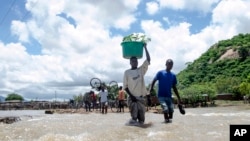The World Food Program reports it is scaling up its humanitarian operations in Malawi, where more than 600,000 people are suffering from the worst flooding to hit the country in 15 years. The flooding has killed more than 200 people.
The annual flooding in Malawi is the worst in many years. The World Food Program warns that the situation is likely to worsen as Malawi’s rainy season does not peak until mid-February and heavy rains are forecast to continue.
Aid agencies have been trying to help the more than 600,000 people affected by the flooding since Malawi's president declared 15 of the country’s 28 districts a disaster.
WFP has sent food to about 230,000 people in seven districts, but finds this is not enough and says it aims to reach an additional 160,000 people.
WFP spokeswoman Elizabeth Byrs said many people living in the worst flood-affected places and in remote areas are extremely difficult to reach.
“Roads, bridges are damaged or washed away. Some flooded areas remain cut off from markets and food supplies. WFP has one helicopter, which arrived in the country on the 23rd of January to support delivery of food and also to transport humanitarian relief cargo. We would need an additional helicopter, a special 4-wheel drive fleet and also boats,” she said.
Disease spreads
Byrs said most of the 260,000 people rendered homeless by flooding are living in camps, while others are staying in public buildings, schools or with host families.
She said sanitation and hygiene are huge problems, giving rise to many health concerns.
“We can see already cases of scabies among the population and also increased cases of malaria and diarrhea. As the assessment mission and the monitoring improve, we can see more and more cases of malnutrition in camps and those malnutrition cases are expected to rise in the near future,” said Byrs.
WFP worries about the long-term consequences, the soil is saturated, crops are damaged, and livestock have been washed away. Last year, Malawi enjoyed a bumper maize crop, but the outlook for this year is bleak.
The agency says it urgently needs $17.5 million for its expanded flood-relief operation in Malawi.




